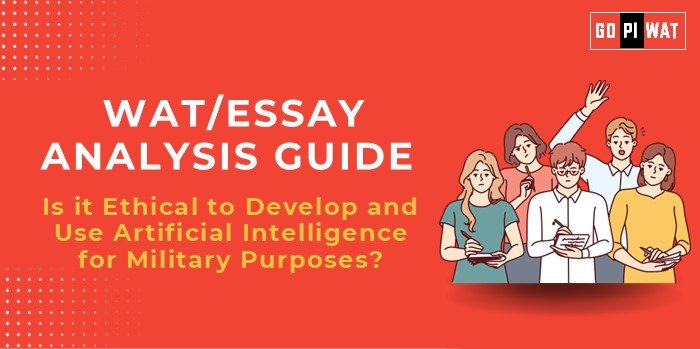📋 Written Ability Test (WAT) Analysis Guide
Is it Ethical to Develop and Use Artificial Intelligence for Military Purposes?
🌐 Understanding the Topic’s Importance
AI in the military is a crossroad of ethics, innovation, and policy, directly impacting global security and B-school themes like governance and risk management.
🕒 Effective Planning and Writing
- Time Allocation:
- Planning: 5 minutes.
- Writing: 20 minutes.
- Reviewing: 5 minutes.
- Preparation Tips:
- Identify key arguments and counterpoints.
- Integrate examples and ethical frameworks.
✍️ Introduction Techniques for Essays
- Contrast Approach: “While AI promises precision in defense, it also presents an ethical minefield in autonomous warfare.”
- Solution-Based: “Developing military AI ethically requires international cooperation and robust accountability mechanisms.”
📚 Structuring the Essay Body
- Achievements: AI’s success in logistics and threat assessment.
- Challenges: Risks of bias, accountability, and misuse.
- Future Outlook: The need for global AI ethics frameworks.
📄 Concluding Effectively
- Balanced Perspective: “Military AI’s ethical challenges demand that innovation proceeds with caution, emphasizing humanity’s collective responsibility.”
- Global Comparison: “Learning from nations like Estonia and Singapore, international consensus on AI ethics is essential for sustainable progress.”
✅ Analyzing Successes and Shortcomings
- Key Achievements:
- Real-time decision-making enhancements.
- Cybersecurity advancements.
- Ongoing Challenges: Autonomous systems’ accountability.
- Global Context: The UN’s efforts to regulate LAWS.
🔧 Recommendations for Sustainable Progress
- Establish an international AI ethics consortium.
- Mandate human oversight in all autonomous systems.
✏️ Sample Short Essays (100 Words Each)
Balanced Perspective:
“AI in military applications offers precision and efficiency, but ethical concerns, such as accountability and escalation risks, require proactive regulation. By integrating oversight mechanisms, we can harness AI’s potential responsibly.”
Solution-Oriented:
“The ethical use of military AI necessitates robust frameworks. Collaborative efforts among nations can ensure AI development aligns with humanity’s broader interests while minimizing risks.”
Global Comparison:
“Comparing AI use in defense globally highlights diverse challenges. The UN must spearhead initiatives to regulate military AI, ensuring innovation does not come at the cost of ethics.”


